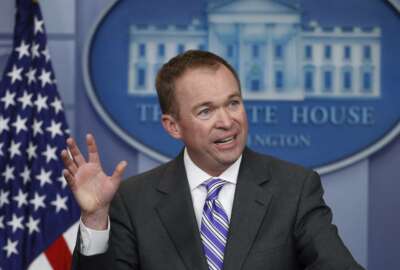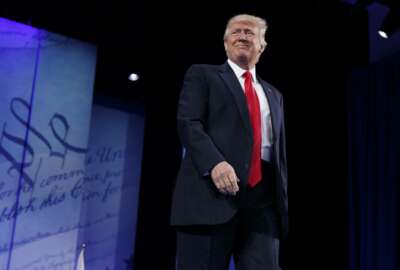
Trump vows to rebuild military, end threat of sequester
President Donald Trump’s first address to a joint session of Congress offered few new insights into his management agenda, only reiterating his desire to reduce...
President Donald Trump offered few new insights about his management agenda in his first address to a joint session of Congress, but did make at least one promise that should give at least some in government hope of returning to budget normalcy.
The president told a joint session of Congress he would submit a budget in the coming weeks that would end the threat of sequestration for the Defense Department.
“I am sending the Congress a budget that rebuilds the military, eliminates the Defense sequester, and calls for one of the largest increases in national defense spending in American history,” Trump said Feb. 28. “My budget will also increase funding for our veterans. Our veterans have delivered for this nation — and now we must deliver for them.”
Mike Mulvaney, the director of the Office of Management and Budget, said Feb. 27 that Trump’s fiscal 2018 “budget blueprint” includes $603 billion for Defense spending — a $54 billion increase — and $462 billion in non-defense discretionary spending.
Trump, however, made no mention of removing the threat of sequestration for civilian agencies. Civilian agencies are facing on average a 10 percent cut, with some recent reports claiming the State Department and the U.S. Agency for International Development could see reductions as high as 35 percent.
He also offered no insights into how that money would be spent or what priorities would be at the top of his agenda for Veterans Affairs or for DoD.
Rep. Phil Roe (R-Tenn.), chairman of the Veterans Affairs Committee, said in a release that he was pleased with Trump’s commitment to veterans.
“I look forward to continuing to work with President Trump and his administration as we strive to instill a culture of accountability at the Department of Veterans Affairs, and — most importantly — as we continue the fight to ensure every veteran has access to the quality care and benefits they have earned,” Roe said.
In a fact sheet, the White House said Trump ordered a review of military readiness and made it the policy of the United States to rebuild the United States’ Armed Forces. Defense Secretary James Mattis issued two memos Feb. 17 to create cross-functional teams to consolidate tasks and duties.
Trump reiterated several management-related initiatives. He mentioned the one-in, two-out plan for regulations and creating a deregulation task force inside of every agency. He also highlighted the federal hiring freeze and the five-year ban on lobbying by executive branch officials.
In that same vain, Trump called for removing the barriers that make the Food and Drug Administration’s approval process for new drugs “slow and burdensome.”
Trump focused a lot of his speech around law enforcement and announced new initiatives for the Homeland Security and Justice departments.
“I have ordered the Department of Homeland Security to create an office to serve American victims. The office is called VOICE — Victims Of Immigration Crime Engagement. We are providing a voice to those who have been ignored by our media, and silenced by special interests,” he said. “To protect our citizens, I have directed the Department of Justice to form a Task Force on Reducing Violent Crime. I have further ordered the Departments of Homeland Security and Justice, along with the Department of State and the Director of National Intelligence, to coordinate an aggressive strategy to dismantle the criminal cartels that have spread across our nation.”
Trump said largely what GOP leaders were hoping to hear Tuesday night, staying on-message and talking in optimistic tones, even weighing in at one point to settle a brewing dispute over how to repeal and replace the Affordable Care Act.
House Speaker Paul Ryan (R-Ohio) declared the speech a “home run,” pointing to Trump’s embrace for the first time of tax credits — a central element in the Republican plan to replace former President Barack Obama’s health care law.
Those tax credits have sparked a fierce conservative backlash in recent days, imperiling GOP efforts to make good on the party’s long-stated promise to get rid of “Obamacare” and put something better in its place. Ahead of the speech, congressional Republicans had been unsure how far Trump would go in backing their plan, with some pleading openly with him to do so, and many were elated at what they heard.
“We should help Americans purchase their own coverage, through the use of tax credits and expanded health savings Accounts — but it must be the plan they want, not the plan forced on them by the government,” Trump said, as Republicans cheered and Democrats sat silently in their seats.
It remains to be seen whether Trump’s endorsement of refundable tax credits will be enough to tame rebellious conservatives in the House and Senate who have criticized them as a costly new entitlement. The initial response from one key conservative group, the Freedom Caucus in the House, was full of praise for Trump’s speech without mentioning the divisions over tax credits.
“We were pleased the president reaffirmed his commitment to fully repeal Obamacare and replace it with patient-centered, market-driven policy. We share his vision,” the group said.
Trump also addressed taxes, another major issue that is dividing Congress. After weeks of sending mixed signals, he provided hope to House Republican leaders pushing a tax overhaul that would tax imports but not exports. But he stopped short of explicitly endorsing the proposal.
“Currently, when we ship products out of America, many other countries make us pay very high tariffs and taxes, but when foreign companies ship their products into America, we charge them almost nothing or almost nothing,” Trump said.
Without providing specifics, Trump said he will propose to change that.
Rewriting health care and overhauling the tax code are the twin pillars of the Republican-run Congress’ legislative platform this year and GOP lawmakers have been eager for guidance from the president on both counts.
House Ways and Means Chairman Kevin Brady (R-Texas) welcomed Trump’s remarks on taxes, and said “It was also great to hear the president’s strong support for our efforts to repeal Obamacare.”
House leaders hope to meet an ambitious goal of passing health legislation through the House and maybe even the Senate before mid-April. That was looking in doubt as divisions surfaced ahead of Trump’s speech, and it remains to be seen whether the deadline will be met.
Democrats, accustomed to jeering at Trump as he veers off message, advances false claims or resorts to personal insults, argued that in delivering a speech that did none of those things, Trump gave a wrong impression of how he has comported himself as president after five weeks in office.
“President Trump’s speech had an air of unreality because what he said tonight was so different than how he has governed in the first 40 days,” said Senate Minority Leader Chuck Schumer (D-N.Y.).
Latest Budget News
Trump planned to continue his legislative push on Wednesday, meeting with House and Senate leaders for lunch at the White House before leading a legislative affairs strategy session in the afternoon. Senate Majority Leader Mitch McConnell (R-Ky.) also summoned senators to a closed-door afternoon meeting on health care to hash out divisions on the issue in that chamber.
But Republicans’ enthusiastic reception to Trump’s speech could belie tough fights ahead. Trump called on Congress to approve a $1 trillion infrastructure bill, something likely to set up a clash with deficit hawks, and also renewed his call for money for a border wall, which could provoke a spending fight with Democrats and even the threat of a government shutdown.
And underscoring the distance that still remains between Trump and congressional Republicans, the speech made no mention of overhauling the financially-shaky Medicare or Social Security, the expensive, enormous entitlement programs that Republicans have long attacked. Trump’s budget leaves those programs untouched and Ryan has recently declined to say that dealing with them remains a priority.
On health care, far from his blanket statement in January that his plan would ensure “coverage for everybody,” Trump on Tuesday embraced an overhaul that would “increase access,” the phrase House Republicans have used to describe their more modest goal.
Associated Press writers Erica Werner, Alan Fram and Stephen Ohlemacher contributed to this report.
Copyright © 2025 Federal News Network. All rights reserved. This website is not intended for users located within the European Economic Area.
Jason Miller is executive editor of Federal News Network and directs news coverage on the people, policy and programs of the federal government.
Follow @jmillerWFED





